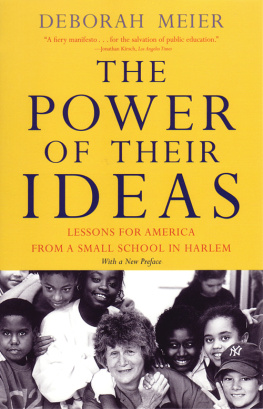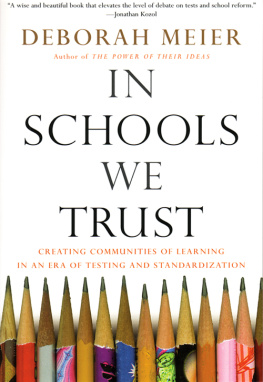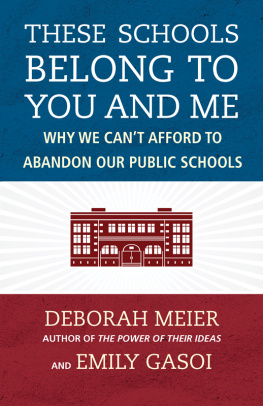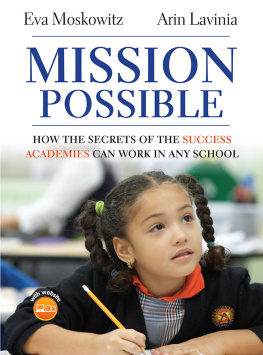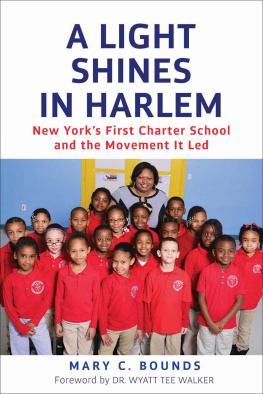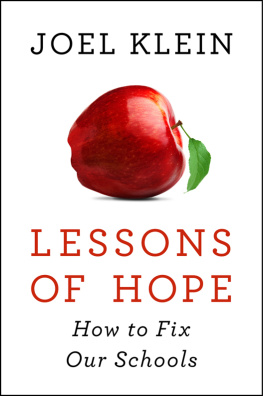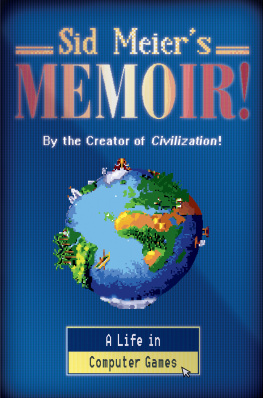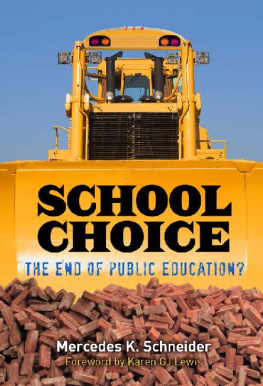Deborah Meier - The Power of Their Ideas: Lessons for America from a Small School in Harlem
Here you can read online Deborah Meier - The Power of Their Ideas: Lessons for America from a Small School in Harlem full text of the book (entire story) in english for free. Download pdf and epub, get meaning, cover and reviews about this ebook. year: 2002, publisher: Beacon Press, genre: Home and family. Description of the work, (preface) as well as reviews are available. Best literature library LitArk.com created for fans of good reading and offers a wide selection of genres:
Romance novel
Science fiction
Adventure
Detective
Science
History
Home and family
Prose
Art
Politics
Computer
Non-fiction
Religion
Business
Children
Humor
Choose a favorite category and find really read worthwhile books. Enjoy immersion in the world of imagination, feel the emotions of the characters or learn something new for yourself, make an fascinating discovery.
- Book:The Power of Their Ideas: Lessons for America from a Small School in Harlem
- Author:
- Publisher:Beacon Press
- Genre:
- Year:2002
- Rating:4 / 5
- Favourites:Add to favourites
- Your mark:
- 80
- 1
- 2
- 3
- 4
- 5
The Power of Their Ideas: Lessons for America from a Small School in Harlem: summary, description and annotation
We offer to read an annotation, description, summary or preface (depends on what the author of the book "The Power of Their Ideas: Lessons for America from a Small School in Harlem" wrote himself). If you haven't found the necessary information about the book — write in the comments, we will try to find it.
Deborah Meier: author's other books
Who wrote The Power of Their Ideas: Lessons for America from a Small School in Harlem? Find out the surname, the name of the author of the book and a list of all author's works by series.
The Power of Their Ideas: Lessons for America from a Small School in Harlem — read online for free the complete book (whole text) full work
Below is the text of the book, divided by pages. System saving the place of the last page read, allows you to conveniently read the book "The Power of Their Ideas: Lessons for America from a Small School in Harlem" online for free, without having to search again every time where you left off. Put a bookmark, and you can go to the page where you finished reading at any time.
Font size:
Interval:
Bookmark:


To my youngest collaborators,
Sarah,
Ezra,
Daniel,
and
Lilli
Beacon Press
25 Beacon Street
Boston, Massachusetts 02108-2892
www.beacon.org
Beacon Press books
are published under the auspices of
the Unitarian Universalist Association of Congregations.
1995, 2002 by Deborah Meier
All rights reserved
Printed in the United States of America
Beacon Press gratefully acknowledges the support of the Unitarian Universalist Veatch Program at Shelter Rock.
11 10 8 7
Text design by Douglass G. A. Scott
Composition by Wilsted & Taylor Publishing Services
Library of Congress Cataloging-in-Publication Data
Meier, Deborah.
The power of their ideas : lessons for America from a small school in Harlem / Deborah Meier.
p. cm.
ISBN 978-0-8070-3113-1 (pbk.) eISBN 978-0-8070-3112-4
1. Public schoolsUnited States. 2. EducationUnited StatesAims and objectives. 3. School management and organizationUnited States. 4. Teaching. 5. Educational innovationsUnited States. I. Title.
LA217.2.M45 1995
372.104210973dc20
94-40196
CIP
In November of 2001, in the wake of the tragedy of September 11, some graduates of the Central Park East Secondary School decided it was time to get together for a reunion. The gathering included CPESS graduates from the years 1991 to 93, all now in their late twenties, along with the teachers they knew from a decade earlier. It was held in a ballroom in central Harlem. This was my first trip back to the city since the tragedy, and I went with a heavy heart. In the end, I drove back home that night newly hopeful. The evening was a reminder of the power that a school built around a strong sense of purpose has to influence lives for a very long time, the power of relationships across generations to make a huge difference, if schools allow them to develop.
At a time when everyone, for both the best and worst reasons, is demanding narrowed academic focus, few of the kids that night referred to traditional academics as they reflected on what the school had meant to them and told each other what was most salient about their lives today. Maybe they took it for granted. They did vividly recall, however, specific experiences of engagement with work that occurred at Central Park East elementary and CPESSthe in-class production of Shakespeare, the re-creation of ancient Egypt, the intense preparation and rehearsal for their graduation presentations to external reviewers, the lunchtime chorus, the daily cooking, the fruit fly experiments, the streams of poetry and short novels they produced, the chairs they designed and built for sixth-grade graduation, the archives of their work, the endless field trips to museums, parks, architectural offices, and community agencies, the wide array of interesting people they had met through the school who became permanent additions to their own networks. They had held on to so many more details than most of us have of our early schooling, and the stuff that occurred during the nine-to-three portion of the day, not just the extracurricular offerings. This contrasts so vividly with what most adolescents think high school is all aboutsporting events, proms, after-school clubs. By their comments one sensed that they knew too that wed be proud of their achievements, above all perhaps those that well served their community or the larger world. They bragged about acts of caring and commitment. They joined the staff in cheers for those many who had become teachers.
The data even at the time we were working with these then children was overwhelming, and this reunion, of course, only sharpened our understanding of how it held up over time. We had known that the percentage of CPE kids who went on to graduate high school, attend college, and hold interesting jobs was far greater than statistically probable. How come? We were never quite sure. What the graduates saybased on both my own informal conversations with so many over the years and on the interviews conducted ten and fifteen years later by David Bensman of Rutgers University (and described in detail in The Graduates of Central Park East, Teachers College Press, 2000)is that the long-term influence of the school was largely due to three things: the relationships the kids built with both their peers and the adults through the school, the schools respect and nourishing of their own personal interests and passions, and finally the strong ties that the school maintained with their families. It was the close family involvement in young peoples school lives, even as they became teenagers, along with the strong peer and teacher networks the kids had built over time, that enabled so many to find a way to go to college and stay there. The kids never became past tense for uswe kept in touch with each other, not only individually but institutionally, by creating our own semi-formal alumni association. Even the need for research became a means of keeping in touch. No wonder then that ten to twenty years later these young peoplesome of whom came to CPE elementary school as six-year-oldswere so full of specific, very particular memories of people who had mattered, and work they had done, talents that got fostered, love affairs they developed with music, writing, engineering, theater, making and buildingand a set of attitudes that stood them in good stead. They largely, even if begrudgingly at times, took responsibility for themselves, their work, their ideas, and the lives they invented for themselves. By my lights there could be no more powerful testament to the power for kids of the kind of schooling we tried to offer.
And the power the school held for adults is also absolutely clear. Nearly thirty years after the founding of CPE, the original CPE elementary school crew are close to sixty (or more) years old. But mostlike Susan Soler, Lucy Matos, Pam Cushing, Barry Solowey, Bruce Kanze, and Susan Harmanin a profession with notoriously high turnover rates, are still working in classrooms, if not at CPE, then at other, similar schools. Three are principals, and several, like Vivian Wallace, Carol Mulligan, and Digna Galarza, are retired but still working with schools and teachers. Only dire necessity forced Connie Brady into retirement. And founder Inez Wilson would still be at work in a school if not for her untimely death in the winter of 02. Only one of the staff from those earliest years changed fieldsand he became a child psychiatrist! The story of the founders of the Central Park East Secondary School a decade later is similar. Of the early crew, nearly half went on to start new small high schools when the chance opened up (I love ticking off the numbers and names to myself). Most of these schools are still going strong despite all the pressures to give in, comply, join the crowd. And part of this perseverance is related to the power of the relationships the schools fostered that made it hard to look for private solutions when the communal ones that had meant so much to them and their students called outyou are still needed. They held on to that dream, and with few regrets. The experience of CPE turned out to encourage new experiments, exactly what we had hoped it would do. Schools like CPE are engines of change: they tend to replicate themselves and spread, given half a chance.
CPEs remarkable continued development is not only a reminder of the impact of the formal leadership of a school (such as Jane Andriass at CPE these days) but also of the role of teachers who have used the classroom as the focus for their educational leadership for over thirty years and are still at it, some in that same schoolfor example, Alice Seletsky and Donnie Rotkin. Sid Massey and River East and staff, the third offshoot from CPE, have a similarly remarkable story. And the stories go on and on.
Font size:
Interval:
Bookmark:
Similar books «The Power of Their Ideas: Lessons for America from a Small School in Harlem»
Look at similar books to The Power of Their Ideas: Lessons for America from a Small School in Harlem. We have selected literature similar in name and meaning in the hope of providing readers with more options to find new, interesting, not yet read works.
Discussion, reviews of the book The Power of Their Ideas: Lessons for America from a Small School in Harlem and just readers' own opinions. Leave your comments, write what you think about the work, its meaning or the main characters. Specify what exactly you liked and what you didn't like, and why you think so.

